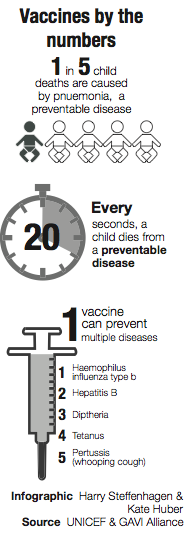The importance of immunization
Vaccines are crucial for society’s health

March 16, 2015
Members of any community have the responsibility to help prevent others from contracting disease by getting vaccinated.
Not immunizing yourself is dangerous. By failing to comply, you are risking the health of yourself and everyone you come in contact with.
Refusing vaccination prevents herd immunity, the ability of a community to protect itself from disease. According to PBS, herd immunity is a barrier between disease and health; the more people immune, the stronger the shield is.
There are only two ways to become immune. One is to contract the disease and the other is to become vaccinated against it. Because the latter prevents the possibility of damage to your body or possibly death, it is clearly the better option.
According to the Centers for Disease Control and Prevention, in 2014 an overwhelming amount of unvaccinated people caused the largest outbreak of measles since it was eliminated in the United States from 2000-2001.
The United States is again experiencing a massive outbreak of the disease, which has been linked to an amusement park in California.
According to the Mayo Clinic, the dangers of this infection can be grave. Complications stemming from measles include bronchitis and laryngitis, pneumonia and encephalitis. The disease kills more than 100,000 people a year, most of whom are young children.
According to the CDC, certain diseases such as mumps and rubella require vaccinations every three to five years.
Students should take the initiative to keep their vaccinations up to date, in order to protect themselves and their peers.



